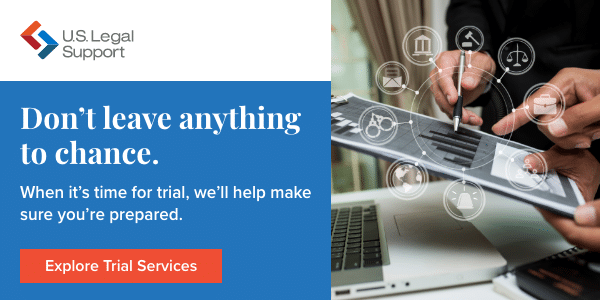Upcoming Technology Trends in Litigation Support

Litigation technology is becoming increasingly important to litigation support services. Firms and legal professionals are leveraging emerging legal tech despite the misconception that our profession can be stuck in its ways and hesitant to change.1 On the contrary, U.S. Legal Support’s 2024 survey shines a light on the technology trends that are driving innovation in the legal field.
Below, we’ll discuss the top insights we uncovered regarding law firms’ legal tech investment, artificial intelligence (AI) adoption, cybersecurity concerns, and remote deposition technology usage.
Investment in Legal Technology and Tools
Looking ahead to 2025, 32.40% of law firms expect investments in legal technology to increase, which is nearly identical to last year’s result (32.21%). However, more firms expect investments to stay the same (33.56% vs. 27.12% in 2023), and just 5.61% of firms expect to decrease their investments in technology, compared to 9.33% in 2023. On the whole, firms expect to maintain or increase their use of technologies such as timekeeping, billing, research, and record management tools.
In terms of new technology to adopt, firms’ top priorities for digital transformation are:
- Data management and retention – 59.67%
- eDiscovery and document review – 42.55%
- Matter management software – 40.14%
- eBilling/cost recovery software – 36.56%
These figures were also virtually identical to their 2023 counterparts. In general, law firms’ outlook for tech investment in 2025 looks very similar to 2024.
One critical area that will likely drive increases in tech investment is firms’ increased use of legal AI tools in the future. The share of firms that foresee greater usage of AI in 2025 is 31.72%, which is very close to the number of firms that foresee greater technological investment (32.21%).
This suggests that a large portion of law firms’ tech investments in 2025 could be AI-related.
Increasing AI Adoption in Legal Practices
One of the most intriguing insights from our survey was the increase in law firms already using AI tech, including generative AI (genAI) tools. In 2023, 21.25% of respondents used AI for legal research, document management, and predictive analysis. In 2024, that share has risen to 25.92%, an increase of 21.98% year-over-year (YoY).
Context for AI Adoption in Law and Other Fields
One important caveat to our findings is that measures of AI adoption across the industry vary widely. One study claims to have found that a commanding majority of law firms (79%) are now utilizing AI technology.2 However, a closer look at its findings reveals that just 8% have fully (“universally”) adopted it, and just 17% have even adopted it “widely.” The figures for “minimal” and “partial” adoption (i.e., for some tasks or provisionally) sit at 34% and 21%, respectively.
This would be more in line with what nationwide polling has found with respect to AI adoption across various fields. Per a Bipartisan Policy Center Survey, here are some of the top industries adopting AI3:
- Information services firms – 18.1% AI adoption
- Professional or technical services firms – 12% AI adoption
- Educational services firms – 9.1% AI adoption
After accounting for extremes, both high-end results and moderate results (like ours) show that law firms’ AI adoption is significantly higher in the legal profession than in other industries.
Together, these findings suggest that the legal profession is ahead of the curve in terms of integrating this innovative technology—and reaping the benefits that come along with it.
Cybersecurity in Litigation Support
It’s important to consider what law firms are doing to ensure security across their information technology (IT) infrastructure. To that end, neary 73% of firms had a security policy in place in 2024.
However, roughly the same number of firms were targeted by a cyberattack over the past two years (20.92% in 2024 vs. 19.85% in 2023). Law firms will need to commit to securing their systems, especially with greater investment in technology.
Another interesting takeaway here relates to the intersection of AI adoption and cybersecurity.
A joint commission headed up by the National Security Agency (NSA) issued a public notice about the risks of rapid AI deployment, as the new and emerging technology is susceptible to a greater volume and diversity of attacks relative to legacy systems.4 Of the firms we surveyed, those that safeguard against AI threats tended to use training and education (22.63%) and human oversight (19.83%) in order to do so. Greater adoption of AI will likely require more robust protections.
Data Privacy and Legal Support Services
Another key insight related to law firms’ cybersecurity considerations is the role that data privacy plays in vendor selection. Privacy is a key element of cybersecurity, and ensuring sensitive information isn’t breached is one of the main goals of a firm’s cyber defenses.
This was reflected in our results, as privacy and security concerns are the biggest factors considered when law firms vet legal technology vendors and litigation support providers:
- Vendors’ data privacy policies are a top priority for 70.86% of firms
- HIPAA compliance audits are a top priority for 51.14% of firms
- End-to-end encryption for files is a top priority for 45.54% of firms
- Vendors’ cyber liability coverage is a top priority for 25.81% of firms
Put differently, these concerns cover various aspects of data privacy and security: governance, controls, insurance in the case of a breach, and compliance with regulations like the Health Insurance Portability and Accessibility Act (HIPAA). They’re all critical to a firm’s overall security posture.
Potential Consequences of Data Privacy Lapses
Law firms must take cybersecurity and data privacy seriously. Failure to do so could result in significant financial and reputational damage to the firm and its professionals.
Compliance is one of the most important—and challenging—elements of data privacy. HIPAA audits rank so high on firms’ priorities for technology vendors because their rules can be hard to understand, apply, and follow. Legal professionals might assume that their own devices fall outside HIPAA protections, but its rules apply both to covered entities within healthcare and business associates thereof. Any individual or practice that comes into contact with protected health information (PHI), like medical treatment and payment records, needs to protect them.
Failure to abide by HIPAA compliance can lead to direct monetary penalties and criminal charges brought against individuals. The Department of Health and Human Services (HHS), the Department of Justice (DOJ), and local governments all work together to enforce HIPAA. One recent case involving a New York firm resulted in a fine of $200,000 to the state Attorney General.5 In addition, firms that break HIPAA rules need to work to regain public, partner, and client trust.
Remote Depositions and Virtual Tools
Our survey indicated that law firms’ usage of remote deposition technology will likely continue to increase moving into 2025 and beyond. Remote depositions have become a critical component of litigation due to their many benefits, including flexibility, cost-savings, and efficiency. They’re here to stay and will only continue to improve.
In particular, 30.95% of respondents in 2023 expected their use of remote depositions to increase moving into 2024. This year, that figure has increased to 34.31% of firms.
Here are the benefits and features firms are looking for in their remote deposition solutions:
- Ease of use (69.56%)
- Functionality (58.58%)
- Affordability (37.76%)
- Security (30.65%)
These have remained roughly the same YoY, with slight bumps in affordability and security.
Additionally, and parallel to overall tech investment, more firms now believe remote deposition use will stay the same moving forward (44.96% in 2023 vs. 47.80% in 2024), and fewer foresee less use (17.15% in 2023 vs. 12.24% in 2024). This means that remote depositions, like other legal tech tools, are more likely to stay the same or increase in usage. Practices that adopt technologies are best positioned to succeed in 2025 and beyond, as they’ll be able to optimize costs and increase efficiencies.
Stay Ahead of Tech Trends in the Legal Profession
Our 2023 and 2024 surveys indicate upticks in technology adoption across the legal profession. Firms are more committed to maintaining or increasing tech investments, AI is becoming more prevalent, cybersecurity is increasingly critical, and remote depositions are being leveraged by more and more forward-thinking professionals.
U.S. Legal Support helps firms stay ahead of the curve by leveraging cutting-edge technology strategically to optimize efficiency and security while reducing costs. Our full suite of litigation support services includes remote deposition platforms, digital exhibit storage and sharing, AI document translations, and more.
To learn more about how we can help you, get in touch today!
Sources:
- ALM (law.com). Debunking the Myths of Legal Technology Adoption. https://www.law.com/legaltechnews/2023/10/24/debunking-the-myths-of-legal-technology-adoption/
- LawSites. AI Adoption By Legal Professionals Jumps from 19% to 79% In One Year, Clio Study Finds. https://www.lawnext.com/2024/10/ai-adoption-by-legal-professionals-jumps-from-19-to-79-in-one-year-clio-study-finds.html
- Bipartisan Policy Center. Taking Stock of AI Adoption Across the U.S. Economy. https://bipartisanpolicy.org/blog/taking-stock-of-ai-adoption-across-the-u-s-economy/
- National Security Agency. Deploying AI Systems Securely. https://media.defense.gov/2024/Apr/15/2003439257/-1/-1/0/CSI-DEPLOYING-AI-SYSTEMS-SECURELY.PDF
- The HIPAA Journal. New York Law Firm Pays $200,000 to State AG to Resolve HIPAA Violations. https://www.hipaajournal.com/new-york-law-firm-200000-settlement-new-york-hipaa/
- U.S. Department of Health and Human Services. Business Associates. https://www.hhs.gov/hipaa/for-professionals/privacy/guidance/business-associates/index.html

Editoral Policy
Content published on the U.S. Legal Support blog is reviewed by professionals in the legal and litigation support services field to help ensure accurate information. The information provided in this blog is for informational purposes only and should not be construed as legal advice for attorneys or clients.


